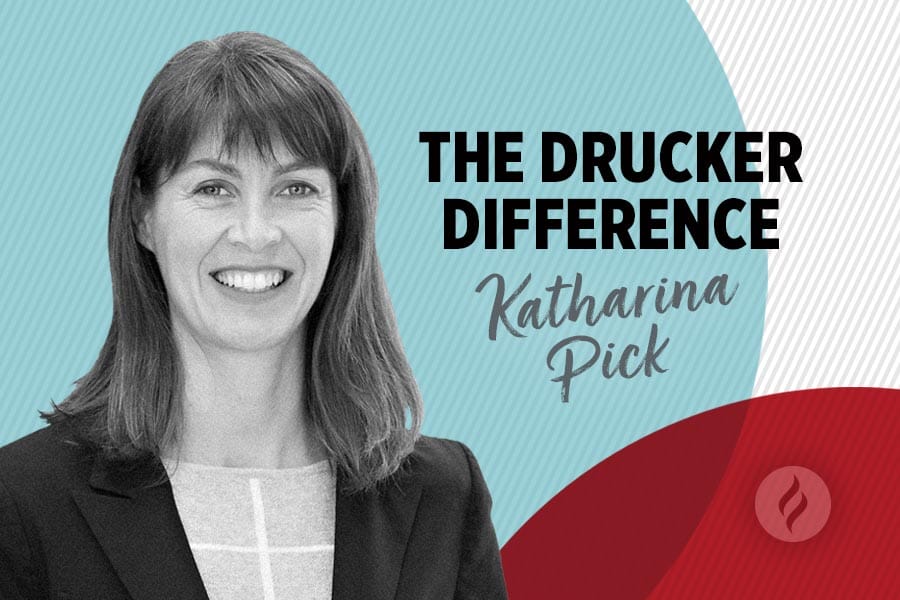The Drucker Difference: On Reinventing Yourself

What does it mean to reinvent yourself? It can be as dramatic as pursuing a new career or as simple as developing a “parallel career,” an activity that fulfills you as you continue what might feel like a daily grind. Any number of pursuits can serve this purpose: volunteering for a cause you care about, coaching young professionals in your field, or applying your expertise to companies in need of guidance. There is no question that reinvention takes courage, whether it is voluntary or a forced reinvention after a layoff. It is the idea that reinvention is a desirable and necessary part of life that is so important.
Decades before the fixation on “quiet quitting,” Peter Drucker recognized reinvention as an absolute necessity—even for the most successful knowledge worker—for the simple reason that no workplace or job can sustain our human need for growth, learning, and challenge beyond a certain period. Acknowledging this can free us to find new avenues for contribution and fulfillment, improving our lives and helping society.
Reinvention must happen when inevitably we reach a point in our lives or careers where we are no longer learning and growing. Drucker anticipated in 1999 that this would increasingly be a challenge as people lived longer, healthier lives, yet worked within an outdated model of a singular career. He pointed to tired and bored 45-year-old professionals who had accomplished and learned all they were going to learn in their jobs but stayed in them anyway, becoming a drag on their organizations and living lives of boredom and stagnation. Today, career paths are more varied, and especially younger knowledge workers behave more like free agents than “company people.” Yet most are still captive to a singular definition of success, shaped by the norms and expectations of one industry culture, or one graduate degree, or one life plan.
“Reinvention must happen when inevitably we reach a point in our lives or careers where we are no longer learning and growing.”
Our choices are constrained by our previous accomplishments; and yet our talents, passions, and opportunities are diverse and always evolving.
When we find our enthusiasm and energy waning, or when we are suddenly thrust into unemployment, we need to ask ourselves: What do I still want to learn? What do I want to contribute? What has happened over the course of my life? How has it changed my priorities, and what do I want to do about it?
Life is not a smooth journey for anyone. As Drucker himself noted, in life, we all experience losses and difficulties that shape us and our priorities. Reinvention is an opportunity for us to better integrate our lives. Reinvention happens by beginning to pay attention to our energy, to what makes us feel most alive and to what does not, to how we spend our time and who we spend it with, and to the balance we have struck in our lives.
Peter Drucker not only wrote about reinvention and taught it, but he also lived it by following a lifelong passion. When he moved to Claremont as a professor at age 63, he did so to teach Japanese Art History. This was before he founded the country’s first executive MBA program at Claremont Graduate University. He filled his life with diverse interests and people, which stimulated his thinking. Given the impact of his writings on management, many people might not realize that he wrote two-thirds of this work after he came to Claremont, in the last three decades of his life.
Peter Drucker’s life should serve as a reminder that the best may in fact be yet to come.
Katharina Pick is associate clinical professor at the Drucker School of Management, where she also served as interim dean. Her teaching and research focus on organizational behavior and leadership with an emphasis on gender and diversity, creating high performing teams, and the process of leadership development.
More from The Drucker Difference: